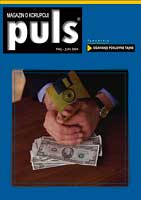Politika sprečavanja pranja novca u susednim zemljama
Anti- Money Laundering Policy in the Neighboring Countries
Author(s): Srđan KoraćSubject(s): Politics / Political Sciences
Published by: Centar za menadzment
Keywords: money laundering; southeastern Europe
Summary/Abstract: The basis of anti money-laundering policy in the neighbouring countries is the identification of the sources of illegally obtained benefits. Part of the illegal income is generated typically on the domestic territory through the organisation of chains of prostitution, kidnapping, fraud, abuses of the privatisation process and the so-called “grey economy”. Significant illegal gains derive also from the “joint venture” actions by local and international organised crime groups in the narcotics, arms, stolen vehicles, cultural treasures and human trade, and to a lesser extent from tobacco-smuggling and illegal trafficking in alcohol, coffee and fuel. An important money-laundering control mechanism in all neighbouring countries consists of legal obligations being imposed on the financial institutions with a view of establishing the identities clients, making suspictions transactions reports to the police, keeping of records on the transactions and the implementation of strict internal control rules over the employees of financial institutions. Special norms relating to organised crime allow the police and the prosecution to seize temporarily the documents of financial institutions that are relevant for their investigations. Special investigative techniques are also authorised, including surveillance, observation, interception of telecommunications, recording of telephone conversations and access to protected computer systems. The processing of money-laundering cases requires the confiscation of illegal profits in a short time span. This is why the national legislation of the neighbouring countries contain provisions on the confiscation regime that relate to both direct and indirect illegal gains of capital and profits generated through the ownership rights over capital. The iimplementation of these measures relating to the prevention, detection and repression of money-laundering is within the competencies of special government agencies or directorates that are either independent under the umbrella of Ministries of Finance, or are completely organisationally independent. Their competencies include also the collection, processing and analysis of data from the suspicious transactions reports filed by financial institutions. If any of the transactions contains elements of the crime of money-laundering, the documents are then forwarded to the police and the prosecution and formal investigation is initiated.
Journal: Puls
- Issue Year: 2004
- Issue No: 05-06
- Page Range: 25-29
- Page Count: 5

